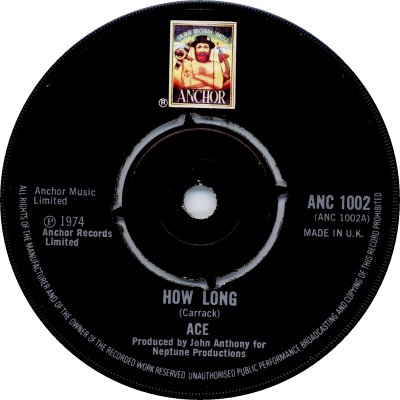
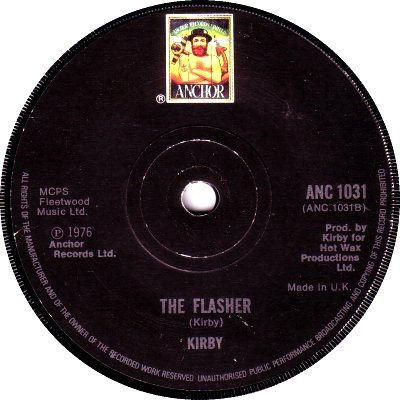
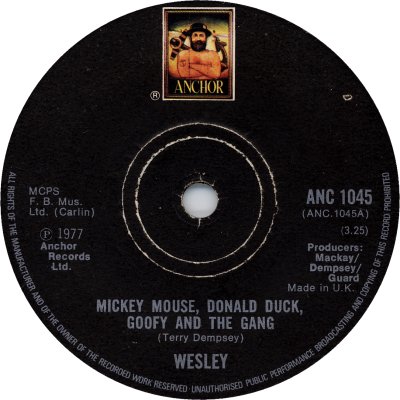
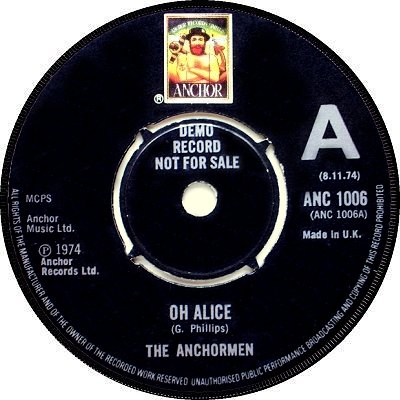

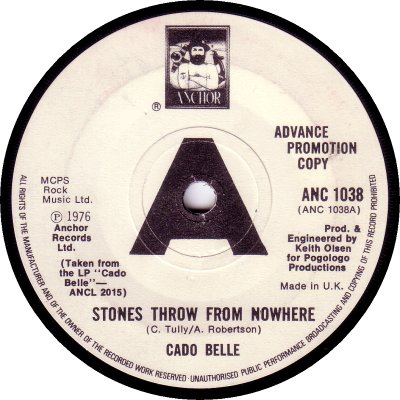
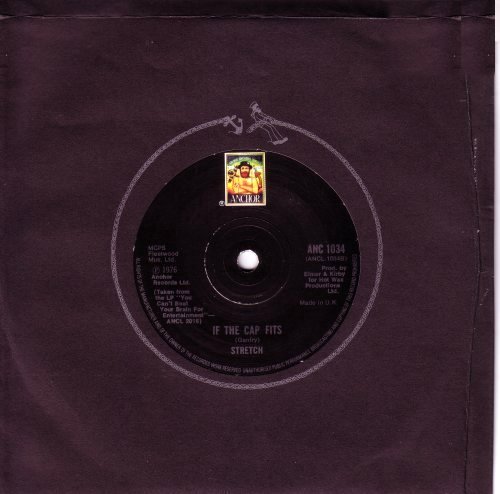
A UK company formed by ex-WEA man Ian Ralfini with the backing of the American Broadcasting Company Inc. and underwritten by ABC's leisure group. Plans for Anchor were finalized in January 1974, according to 'Music Week' of the 19th of that month, though it was expected to be three or four months before the first records appeared. ABC had its own labels in the USA, ABC and Dunhill, the material from which was issued on the Probe label (q.v.) here at that time; the formation of Anchor led to Probe being discontinued and the ABC label (q.v.) replacing it. The two new labels remained in the EMI family, ABC having had a licensing deal with that company since the late 1950s. According to the 'MW' article they were intended to be run as separate and competitive entities despite their close links. Anchor was to have a mutual distribution agreement with ABC - it would handle the new ABC label here, through its deal with EMI, while ABC would handle the Anchor label in the States.
Anchor issued the first ABC records here in July 1974, and started putting out records under its own name in October of that year. Singles were numbered in an ANC-1000 series - EPs had an ANCE prefix - and the company enjoyed an early Chart success with the second of them, Ace's 'How Long' b/w 'Sniffin' About' (ANC-1002; 9/74). 'MW' of the 14th of September confirmed that Anchor's products would be distributed by EMI but said that it would have its own sales force. The article stated that Anchor intended to concentrate on developing UK talent and releasing records by those artists. It added that Konk and Impulse (q.v. both) had signed licensing agreements with the new company, and arrangements had been made for it to handle artists from ABC's recently acquired Famous Music group, including Paramount, Dot and Blue Thumb (q.v. all), when their current agreements ran out. Briefly the company had its own promotions team, but the experiment was abandoned after a month ('MW', 9th November 1974).
In September 1975 Anchor switched its pressing and distribution from EMI to CBS; it also took over responsibility for the revived NEMS label (q.v.). After splitting with Island in August 1976 Virgin (q.v.) came on board, giving Anchor 'Total sales responsibility' for its products ('MW', 21st August), but the agreement only lasted for six months or so. There were plans for a sales partnership but they were cancelled, Virgin choosing to set up its own sales force instead ('MW', 29th January 1977). Other companies replaced Virgin, however: Chiswick signed a six-month pressing and distribution deal with Anchor in July 1977, Aura signed up for distribution in April 1978, and Imagination signed a short-term pressing and distribution deal in August of that same year (q.v. all). In addition to looking after other companies' records Anchor chalked up another couple of Singles Chart successes of its own with Stretch's, 'Why Did You Do It' b/w 'Write Me A Note' (ANC-1021; 10/1975) and 'Gary Gilmore's Eyes' b/w 'Bored Teenagers' by The Adverts (ANC-1043; 8/77). Unfortunately, however, it failed to unearth a consistent Chart artist. Even a trio of singles by proven hit-maker Alice Cooper failed to make an impression.
Despite Anchor's growing and maturing, there were troubles ahead. Managing director Martin Wyatt and head of Anchor's publishing arm Charlie Crane left in the spring of 1978 to form their own label, 'Bright' (q.v.) ('MW', 18th March), and the summer of that year saw the company's sales representatives replaced by a telephone sales team ('MW', 22nd July). Then 'MW' of the 21st of October 1978 revealed that founder and managing director Ralfini was to resign at the end of the year; they quoted him as saying that Anchor's future was 'Up to ABC'. Ken Evans took over as MD in January 1979, but he wasn't destined to stay in the job for long. In February parent company ABC was taken over by MCA. 'MW' of the 10th of that month said that Anchor's future hadn't yet been decided, but by the middle of the next month talks were going on to arrange its winding down. In the issue of the 24th of March 'MW' reported that Anchor had finally closed down and that all twenty-four members of staff had been made redundant. It had no artist roster of its own, and it had issued no records for several months. The article said that Anchor had never made a loss during its five-year existence, which made its closure doubly hard. Its final mention in 'MW' (16th June 1979) was that a meeting of creditors had been arranged for the 15th of June.
The label design for issues remained basically the same throughout Anchor's existence, though the switch from EMI to CBS saw a repositioning of the producer credits from six o'clock (1) to three o'clock (2). In October 1977, with the release of ANC-1045, a minor change took place: the logo lost the wording which had been above the sailor's head (3). One very noticeable difference between EMI and CBS pressings is that the former almost always had dinking perforations, narrow ones, while the latter hardly ever had them - and when they did have them the perforations were wider than the EMI ones. 'How Long' can be found in both forms; presumably it was selling well enough after the move to CBS for it to be re-pressed. EMI-era promos were marked in the usual EMI-family style; the first seven singles had the release date on them (4) - thanks to Martin O'Connor for that scan - but the rest did not (5). That style was retained for several months following the move to CBS, but after a brief flirtation with a larger central silver 'A' in April 1976 a plain white label was adopted (6). One company sleeve served throughout (7). Anchor had a couple of associated labels: Handkerchief (q.v.), for Pop product which did not fit in with the image of the main label, and, for just one issue, Ice (see 'Ice - Kevin Kitchen').
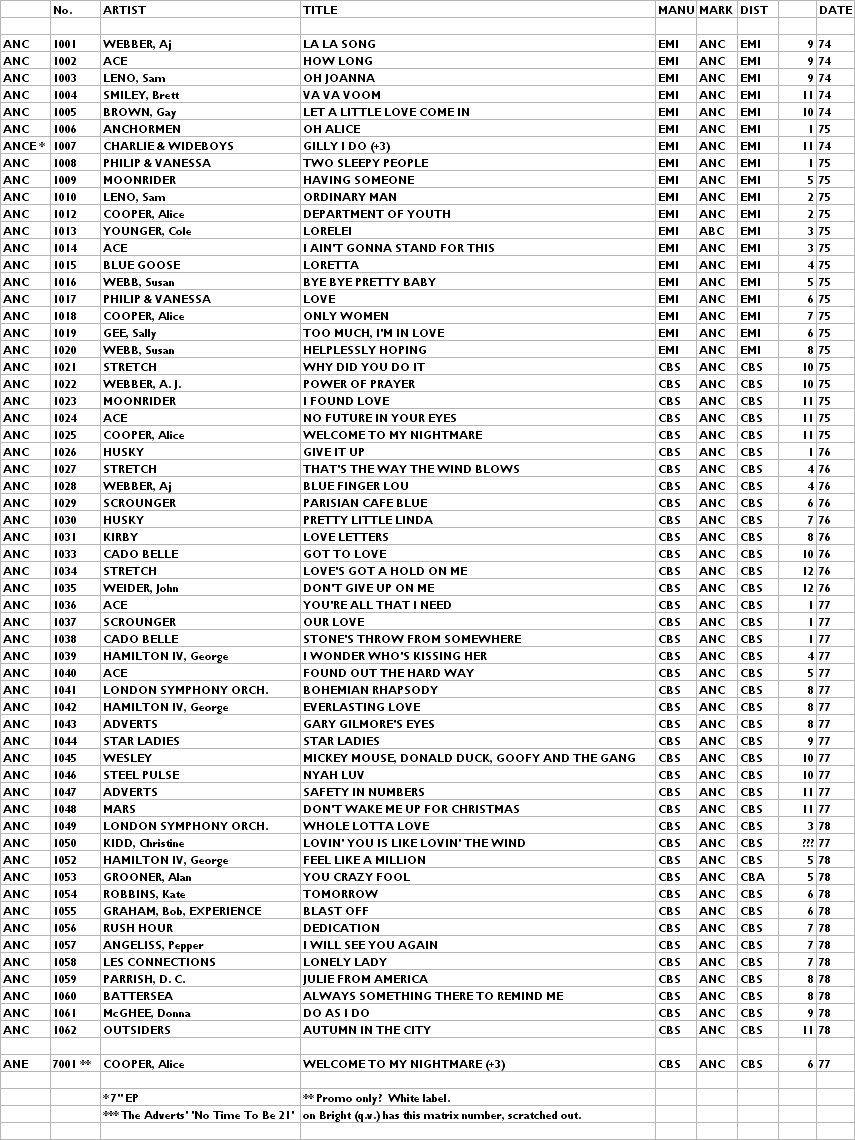


Copyright 2006 Robert Lyons.

